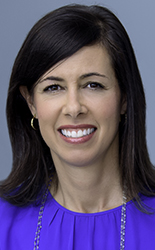Senators subjected two of President Joe Biden's top picks from the telecom and consumer protection space to a stiff round of questioning as lawmakers weighed the future direction of two federal agencies.
Jessica Rosenworcel, acting chairwoman of the Federal Communications Commission, and Alvaro Bedoya, Biden's nominee to the Federal Trade Commission, testified before the Senate Commerce Committee during a Nov. 17 hearing, alongside other nominees picked by the White House to carry out Biden's progressive agenda. Senators asked Rosenworcel about net neutrality protections and the need for better broadband deployments maps, while they asked Bedoya about facial recognition regulation.
In her opening statement, Rosenworcel outlined the commission's achievements throughout 2021 and highlighted that communications technologies can expand opportunities and break down barriers. "New technologies touch every aspect of our lives," she said.
 If confirmed, Jessica Rosenworcel will become the first woman to chair the FCC. If confirmed, Jessica Rosenworcel will become the first woman to chair the FCC.Source: FCC |
She added that the commission's job is not over. "We need to make sure 100% of us in this country have access to fast, affordable, and reliable broadband — every household, every business, every consumer, everyone, everywhere."
Rosenworcel and net neutrality
Rosenworcel was grilled by Sen. Roger Wicker, R-Miss., about accurate broadband mapping and the need for better maps before infrastructure spending begins. Rosenworcel said more collaboration with the Commerce Department will be necessary to best use the dollars allotted.
She was also asked by Wicker about net neutrality. Biden has encouraged the FCC to reinstate net neutrality protections that prohibit broadband service providers from blocking or throttling legal internet traffic or prioritizing certain traffic for payment. To reinstate those protections, the FCC under Rosenworcel's leadership will seek to once again reclassify broadband as a Title II telecommunications service, giving the agency more regulatory authority over broadband service providers such as Comcast Corp., Charter Communications Inc., AT&T Inc. and Verizon Communications Inc.
In 2018, under Republican leadership, the FCC classified broadband as a Title I information service and eliminated the FCC's authority to enforce net neutrality protections. The FCC has a transparency rule that requires internet service providers to disclose publicly when traffic is blocked, throttled or prioritized.
Wicker asked Rosenworcel for examples of how consumers or companies had been harmed by the repeal, noting that, from his view, the repeal had helped encourage broadband deployment and investment.
Rosenworcel reiterated her support for net neutrality protections but noted the 2018 repeal had moved the FCC away from the oversight of broadband. The pandemic, she added, has shown that "we need some oversight."
Net neutrality was brought up again by Sen. John Thune, R-S.D., who asked Rosenworcel whether Congress should act on open internet legislation rather than the FCC ping-ponging back and forth on the matter. Rosenworcel emphasized to Thune that she believes the agency has the authority to reinstate broadband as a Title II service but added that any update to telecom law from Congress is always welcome as many such laws have a "vintage" quality.
Rosenworcel, currently acting FCC chairwoman, was nominated for a permanent chair position Oct. 26. If confirmed, she will be the first woman to serve as permanent FCC chair.
Bedoya and facial recognition
Bedoya in opening remarks touted his consumer privacy advocacy efforts from his time in the Senate Judiciary Subcommittee on Privacy and as director of the Center on Privacy & Technology at Georgetown University.
"I want to help small business owners across the country who are struggling to compete on their merits, without a bigger company using its power to stifle that competition," he said.
Bedoya was later asked by Sen. Deb Fischer, R-Neb., about how he would handle facial recognition technologies. He said he does not anticipate a ban on all commercial uses of facial recognition, but he added that such technologies need greater scrutiny.
Bedoya later supported the expansion of the Children's Online Privacy Protection Act, or COPPA, to ban targeted advertising to 13-, 14- and 15-year-olds. COPPA's protections currently only extend to children under 13 years of age.
Path to confirmation
While Rosenworcel saw an arguably smooth questioning process, sources told S&P Global Market Intelligence that Gigi Sohn, an outspoken net neutrality advocate and Biden's other FCC nominee, may see a rougher nomination hearing and confirmation process from Republican senators.
After the hearing, Sen. Maria Cantwell, D-Wash., told Market Intelligence that she was surprised at the amount of questioning Rosenworcel faced.
"I think it shows you the importance of the broad authority the FCC has," she said. Cantwell added that she would expect Sohn to receive more questioning from senators when her hearing comes. "Even if people agree [with the FCC's leadership], they're still going to have a ton of questions."
Former Republican Commissioner Mike O'Rielly told Market Intelligence that Sohn's confirmation will likely stretch into next year. Sohn sits as a senior fellow at the Benton Institute for Broadband and Society and was a counselor to former FCC Chairman Tom Wheeler. She also co-founded communications advocacy agency Public Knowledge.
Still, assuming a smooth confirmation process for Rosenworcel, the commission can continue doing business while a confirmation for Sohn awaits, former Republican Commissioner Rob McDowell said in an interview.
McDowell added that Rosenworcel can more confidently initiate longer-term projects now that she has the White House's confidence.



